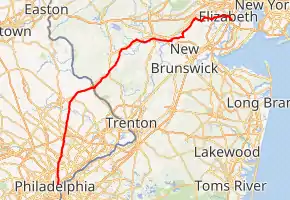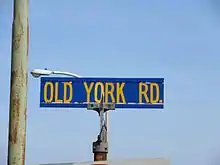Old York Road
Old York Road (originally York Road) is a roadway that was built in the 18th century to connect Philadelphia with New York City. Through New Jersey it was built along the Raritan (Unami tribe) "Naraticong Trail", also known as the Tuckaraming Trail. A memorial plaque to the friendship of the Naraticong Indians, who permitted the road to be built over their trail, sits at the intersection of Old York Road and Canal in Raritan, NJ. The Swift Sure Stage Coach Line completed the journey between the two cities in two days and cost only a few dollars.
| Old York Road | |
|---|---|

| |
| Route information | |
| Existed | 1711–present |
| Major junctions | |
| South end | Philadelphia, Pennsylvania |
| North end | Elizabeth, New Jersey |
| Highway system | |
A ferry left Elizabethtown Point for New York City, or passengers could continue onto Newark and ultimately Powles Hook Ferry (present day Exchange Place in Jersey City) via Bergen Point Plank Road/Newark Plank Road.[1]
Pennsylvania route

Old York Road was laid out from New Hope, Pennsylvania to Philadelphia between 1711 and 1771. Its start (or end) point was at the intersection of Fourth and Vine Streets. A 1960s urban redevelopment project removed most of Old York Road between Vine and Spring Garden Streets, although a remnant remains as the unmarked alley midway between 5th and 4th Streets at Willow Street.[2] North of Spring Garden Street, the Old York Road ran through what is now lower North Philadelphia on a roadbed that is now Fifth Street.[3]
A section still named Old York Road begins at the intersection of Germantown Avenue and West Westmoreland Street in the Rising Sun/Franklinville neighborhood of North Philadelphia. The road continues north and runs concurrently with PA 611 at the intersection with North Broad Street and Oak Lane in the East Oak Lane neighborhood in North Philadelphia.
Old York Road deviates from PA 611 at the intersection with Easton Road in Willow Grove, where it begins to run concurrently with PA 263, which is still called York Road (not Old York Road) even today. From there north, in a pattern that is common along many Pennsylvania highways, some sections of the oldest road route road still exist in a few areas, each carrying a name beginning "Old", in this case Old York Road. This occurs in the village of Hartsville, which sits astride the border of Warminster and Warwick Twp. as well as the village of Bridge Valley in Buckingham, about 3 miles (4.8 km) south of where PA 263/York Road joins US 202. An 8-arch stone bridge over the Neshaminy Creek, built in 1804, still stands on Old York Road in Bridge Valley, but was only open to pedestrian and bicycle traffic since that section of road was bypassed by the 4-lane York Road in 1965 until the bridge was closed to foot traffic by a cyclone fence at each end in 2010. The section of PA 263/York Road from Sugar Bottom Rd. to PA 413 in Buckingham Twp. was resurfaced in 2008-09 for the first time since the 1965 widening, and the section through Warwick Twp. was scheduled to be repaved in 2010-11, but as of the autumn of 2012, that repaving had not yet taken place.
In Lahaska, Old York Road follows US-202 as Lower York Road. Old York Road follows PA 179 into New Hope, as Bridge Street. It briefly deviates and rejoins PA 179. The road forks ahead, with Ferry Street going southeast and Bridge Street going northeast. Bridge Street carries PA 179 across the New Hope-Lambertville Bridge, into New Jersey. The original bridge was built in 1814 and replaced twice after floods. The newest bridge was built in 1904 and provides the closest route to the original Old York Road.
Ferry Street ends at the location of the first ferry dock of John Wells.[4] In 1719, John Wells was given a license to establish a ferry at this location, two years after he bought the land.[5] The Pennsylvania Assembly eventually gave John Wells sole right to operate a ferry from this spot after Thomas Canby attempted to compete with the service. The small village became known as Well's Ferry. Thomas Canby's son, Benjamin later bought the ferry service from Wells. In 1764, John Coryell, who operated a ferry from New Jersey bought the Pennsylvania ferry service from Benjamin Canby. The village later carried the names of Canby's Ferry and Coryell's Ferry before receiving the name New Hope after a 1790 fire.
New Jersey route
Old York Road began at Coryell's Ferry, which was on Emanuel Coryell's property between Church Street and Swan Creek (for which Swan Street is named) in Lambertville. Although this was not the first ferry operated from the New Jersey side, Coryell purchased land here and began operating a ferry service in 1732.[6] The village on the New Jersey side began to be known as Coryell's Ferry. The original route followed Main Street to York Street and briefly joined up with NJ 179, the modern Old York Road.
It continues on NJ 179 with three deviations, including one at Mount Airy, before crossing under US 202. NJ 179 ends in Ringoes and Old York Road continues on the beginning of CR 514. At Reaville in East Amwell, Old York Road leaves CR 514 and joins CR 613. CR 613 continues through Three Bridges, New Jersey and ends at Pleasant Run Road in Centerville in Readington, but Old York Road continues across it and crosses US 202 in Branchburg.
Centerville was so named because of its position between Philadelphia and New York, which made it a resting place for the coaches, which originally took two days to complete the journey. Old York Road then follows CR 637 across US 202 again and joins CR 567 until Raritan, New Jersey.
In Raritan, it follows Somerset Street (CR 626) and joins up with Main St (NJ 28) in Somerville. Old York Road continues to follow East Main Street, which becomes concurrent with CR 533 in Finderne in Bridgewater.
After going through Bound Brook, the Old York Road traveled through Middlesex on modern Raritan Avenue, Union Avenue, Harris Avenue, and William Street, which brought the route to Quibbletown (now New Market) in Piscataway. It then turned north on New Market Road,[7] then roughly followed Front Street to The Plains and Scotch Plains. From there it went to West Fields by Park Avenue, Westfield Avenue, Westfield Road, North Scotch Plains Avenue, and West Broad Street, and to Cranes Ford by Benson Place, 4th Avenue, and North Avenue. In what is now Cranford, NJ, it passed along what is now Lincoln Avenue, past Droeschers Mill.[8] Much of the road from there to Elizabethtown was eliminated, though parts survive as Colonia Road and Jersey Avenue.[9]
A ferry left from Elizabethtown Point in Elizabeth to Holland's Hook (now Port Ivory) on Staten Island beginning in 1736 by Adoniah Schuyler. Holland Hook was named for the early settlers, who came from Holland, but later the name evolved to Howland Hook.[10]
Transportation
- Swift Sure Stagecoach Line - In 1769 the stagecoach line was advertised, among other places, in the New York Gazette. The stagecoach was to leave the Barley Sheaf Tavern "at eight in the morning, arriving at Well's Ferry twelve hours later..." Around 1827 there were three runs each week from Philadelphia to New York. Swift Sure continued operations until the Railroads superseded the stagecoach travel.
Landmarks
Source: Cawley & Cawley[11]
Pennsylvania
- The Old York Road passed near the Betsy Ross House in Philadelphia, Pennsylvania
- The Rising Sun Tavern stood at the crossroads of the Germantown Pike (now Germantown Avenue) and the Old York Road from the mid-18th to the late 19th centuries. It was a landmark for travelers on the Old York Road. An 18th- or 19th-century milestone in Abington Township still tells passing pedestrians, "9 to R S, 11 to P", meaning 9 miles to Rising Sun (the tavern and what was then the village around it) and 11 miles to Philadelphia [Old City].
- Site of the Battle of Crooked Billet. Marker just off Old York Rd. at 70-98 Meadowbrook Ave. Hatboro, PA 19040
- Site of The Log College, William Tennent's College for Presbyterian ministers, 1746. Warminster, Pennsylvania.
- Moland House, in Hartsville, Warwick Township, Bucks County, Pennsylvania. Washingtons headquarters in August 1777.
- Buckingham Friends Meeting House, Buckingham Township, Pennsylvania. Used as a military hospital during the Revolutionary War.
- Ferry toll house at New Hope, Pennsylvania
New Jersey
- Holcombe storehouse, in Mount Airy, New Jersey, c. 1743. On the National Register of Historic Places listings in Hunterdon County, New Jersey
- Ringo's Tavern, c. 1840, 1084 Old York Rd. in Ringoes, New Jersey.
- Andrew Ten Eyck House, Branchburg, New Jersey
- Wallace House, in Somerville, New Jersey, General George Washington's headquarters during the second Middlebrook encampment (1778–79), American Revolutionary War.
- Old Dutch Parsonage, in Somerville, New Jersey
- Somerset Hotel, previously known as Tunison's Tavern, in Somerville, New Jersey
- Van Veghten House, Finderne area, in Bridgewater Township, New Jersey, General Nathanael Greene's headquarters during the second Middlebrook encampment
- Van Horne House, in Bridgewater Township, New Jersey, General William Alexander, Lord Stirling's headquarters during the second Middlebrook encampment
- Middlebrook Hotel, 1700, former tavern in Middlebrook, New Jersey
- Drake House, Plainfield, New Jersey
- Stage House Inn also known as the Scotch Plains Tavern, Scotch Plains, New Jersey, built c. 1737
- Presbyterian Church in Westfield, New Jersey. Original Church built on site in 1735.
- Droeschers Mill in Cranford, NJ.
- Old First Presbyterian Church, founded 1664, Elizabeth, New Jersey
- Boxwood Hall, in Elizabeth, New Jersey
- Elizabethtown Port - Noted site of the landing of Captain Philip De Carteret in 1665. First Royal Governor of the Colony of New Jersey.
See also
- King's Highway (Charleston to Boston)
- Nicholas Scull II
 U.S. Roads portal
U.S. Roads portal Pennsylvania portal
Pennsylvania portal New Jersey portal
New Jersey portal Philadelphia portal
Philadelphia portal
References
- Cawley (1965), p. 51.
- Kyriakodis, Harry. "On Callowhill, Channeling The Ghost Of Old York Road". Hidden City Philadelphia. Retrieved 13 March 2019.
- Ellet, Charles Jr (1843), A Map of the County of Philadelphia from Actual Survey, retrieved 2018-08-26. Via the collection of the Free Library of Philadelphia.
- Wells Ferry
- "New Hope Historical Society". Archived from the original on 2007-12-21. Retrieved 2008-02-20.
- History of the City of Lambertville
- "Map of Middlesex County, New Jersey". Library of Congress, Washington, D.C. 20540 USA. Retrieved 2020-05-05.
- Elizabethtown York Road.
- "Map of Essex County, New Jersey : with the names of property holders &c". Library of Congress, Washington, D.C. 20540 USA. Retrieved 2020-05-05.
- Staten Island Old Names
- Cawley (1965).
Bibliography
- Cawley, James; Cawley, Margaret (1965). Along the Old York Road. New Brunswick, New Jersey: Rutgers University Press. ISBN 978-0-813-50487-2. OCLC 692143813.
- Faris, John Thomson (1917), Old roads out of Philadelphia, Philadelphia: J. B. Lippincott & Co..
External links
- Old York Road Historical Society (Covers the history of the Pennsylvania portion, which goes from Philadelphia to New Hope.)